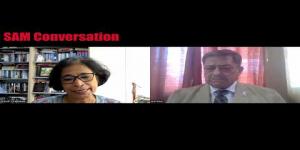The Nightingale has fallen silent: Lata Mangeshkar's music had universal appeal
Numbers have defied easy recording, whether Lata sang 25,000 songs or 30,000, for an estimated 1,000 films, writes Mahendra Ved for South Asia Monitor

It will be no exaggeration, and disrespect to none, to say that Covid-19 has claimed its most celebrated victim in Lata Mangeshkar, who was known and loved as the "Nightingale of India". Not just India or South Asia, the world is poorer, less musical, at her passing away.
She fought the ailment heroically for over a month. The outpourings of concern and support – again, not confined to Indians – shows her music’s universal appeal.
She never held an official position, yet she governed only billions of hearts. A two-day mourning with India’s tricolour being flown at half-mast is but an official recognition of her passing away for four generations – or more, depending upon how one measures the length of a generation.
She died at a ripe 92. But her gritty presence was felt last September on her 92nd birthday, when she announced that she could not stay away from singing and planned to resume singing once she was fine. She had then lamented: Aap sochiye ke mere liye kitna mushqil hai gaane se door rehna”. (You can imagine how difficult it is for me to stay assay from singing). That, alas, did not happen.
Anguish and concern
Her anguish at the current mood in the country shall remain the last testament of her warning that has all but gone unheeded. In an interview to Subhash K, Jha published by Rediff.com, she had said: “Main aapko sach bataoon? Main andar se dukhi hoon. There is so much division in the country. People are getting more and more into 'Main Hindu hoon, woh Mussalmaan hai'. This climate of suspicion and hostility must stop.”
“I had hoped and prayed that this kind of divisive atmosphere would have long ago ended. But I am sorry to say it's getting worse. People are killing one another in the name of religion.”
Nobody has so far responded to this voice of sanity. Hearts and minds that have nurtured on her singing appear to have hardened and numbed.
As much significant as her long innings, if not more, was her expression of concern at the prevailing social conflict among communities. Significant, because it comes from someone who has been known to be sympathetic, emotionally, if not politically, with the right-wing “Hindu nationalists”.
Even without the swan song that she could not record, Lata would be India’s longest-performing singer, if not of the world, in a career that began in 1942, at age 13. Numbers have defied easy recording, whether Lata sang 25,000 songs or 30,000, for an estimated 1,000 films, not counting her ‘non-filmy’ renderings and albums.
They covered 36 Indian and foreign languages, though primarily, Marathi, Urdu, Hindi and Bengali.
Used to being told that hers was one voice that unifies all Indians, she had a ready quip: “That is music to my ears. Believe me, when you say this I feel very humbled. At the risk of sounding immodest...”
Childlike freshness
Age-wise, she outlived all her contemporaries and competitors. If a collage of songs presented when she turned 92 is anything to go by, she had sung for 92 composers, if not more. Stalwarts among them, from Khemchand Prakash to Naushad to Madan Mohan to Khayyam and the duos --- Shankar-Jaikishan, Laxmikant-Pyarelal, Kalyanji Anandji – are gone or no longer active. That includes her brother, Hridaynath, the only brother of the four Mangeshkar sisters, India’s Von Trapp family.
To retain that unique, childlike, freshness in voice at her age was itself a miracle or a record of sorts. Her singing truly defied attitudinal and technological changes that occur with each passing generation.
She lasted so long and also dominated because she adapted. She filled in the vacuum caused by the departure to Pakistan, after the partition of the Indian subcontinent of Khursheed, Noorjehan and other playback singers. Emphasis was on Urdu, while her forte was Marathi and Hindi. A story, perhaps apocryphal, has it that music composer Anil Biswas introduced her to Dilip Kumar. The yet-to-be thespian advised her to perfect her Urdu pronunciation, that it would probably need to be rescued from “a possible aroma of daal-bhaat gruel,” the region’s rice-and-lentils staple.
Lata engaged a maulvi to polish her Urdu and acquired flawless diction. That diligent training was to reflect in her rendition of Ghalib or Sahir, Majrooh or Shailendra. Even Mohammed Rafi couldn’t equal that although he read and wrote in Urdu by heritage. Often in his singing, critics have said, the Punjabi tendency to pronounce waqt as wakt was discernible, not with Lata.
Her versatility was acknowledged in both Hindustani classical and popular Bollywood music alike. 'Amar Akbar Anthony', a 1970s film has a medley rendered by three top singers of the day, Mohammed Rafi, Mukesh and Kishore Kumar singing for characters played by Rishi Kapoor, Vinod Khanna and Amitabh Bachchan. But only Lata crooned for all the three heroines: Shabana Azmi, Parveen Babi and Neetu Singh.
She did face competition and was accused, with a measure or legitimacy, of throttling it, including that of her sister Asha Bhonsle. Asha's career ran parallel with hers, it was on a different note and scale musically. Tales of competition between the two abound, and even movies have been made on that theme. The fact is both were singing.
'Singing is worship'
Awards kept coming through her career and at one stage, she wanted no more, save the national honours. Besides Satyajit Ray, she was the only other to have received both the Bharat Ratna - India's highest civilian honour - and the Dada Saheb Phalke award. She was the fifth woman to receive the Bharat Ratna, after Indira Gandhi, Mother Teresa, Aruna Asaf Ali and M.S. Subbalakshmi.
She was a delight for composer and lyricist. Said poet Javed Akhtar who, invited to write one ghazal for "Saadgi", offered to do several: "There's no singer in this universe who can intonate words the way Lataji can. From the time she sang my first film lyric in 'Silsila' to this new ghazal album, it's always an honour to have her sing to my words. Even if you don't know the meaning of a word, you know through her expression what she means. That's what a lyricist craves for."
Her “Aye mere watan ke logon,” in the wake of the 1962 Sino-Indian conflict, first rendered on the sands of Mumbai’s Chowpaty remains a landmark event that reflected the mood of the nation. In attendance and in tears, Prime Minister Jawaharlal Nehru told her: “Beti, tumne toh roola diya.” (You have made my cry)
Another veteran of the present times, lyricist-filmmaker Gulzar has said Lata's greatness lay in her complete devotion to music. "Singing for her is not merely a profession, it is akin to worship."
To her the best tribute, she told film writer Jha, came decades ago. The great classical vocalist Ustad Bade Ghulam Ali Khan once famously cursed her: “Kambakht kabhi besura nahin gaati.” She wistfully said: “Aap dekhiye uss ek shabd 'Kambakht' mein kitna pyaar hai. Itna pyaar mujhe mila. Mujhe aur kuch nahin chahiye. (Note the affection in that word ‘kambakht’ (cursed). I have never received more love than that. I want nothing more.”)
(The author is a veteran journalist, film aficionado and South Asia watcher. The views are personal. He can b contacted at mahendraved07@gmail.com)












Post a Comment